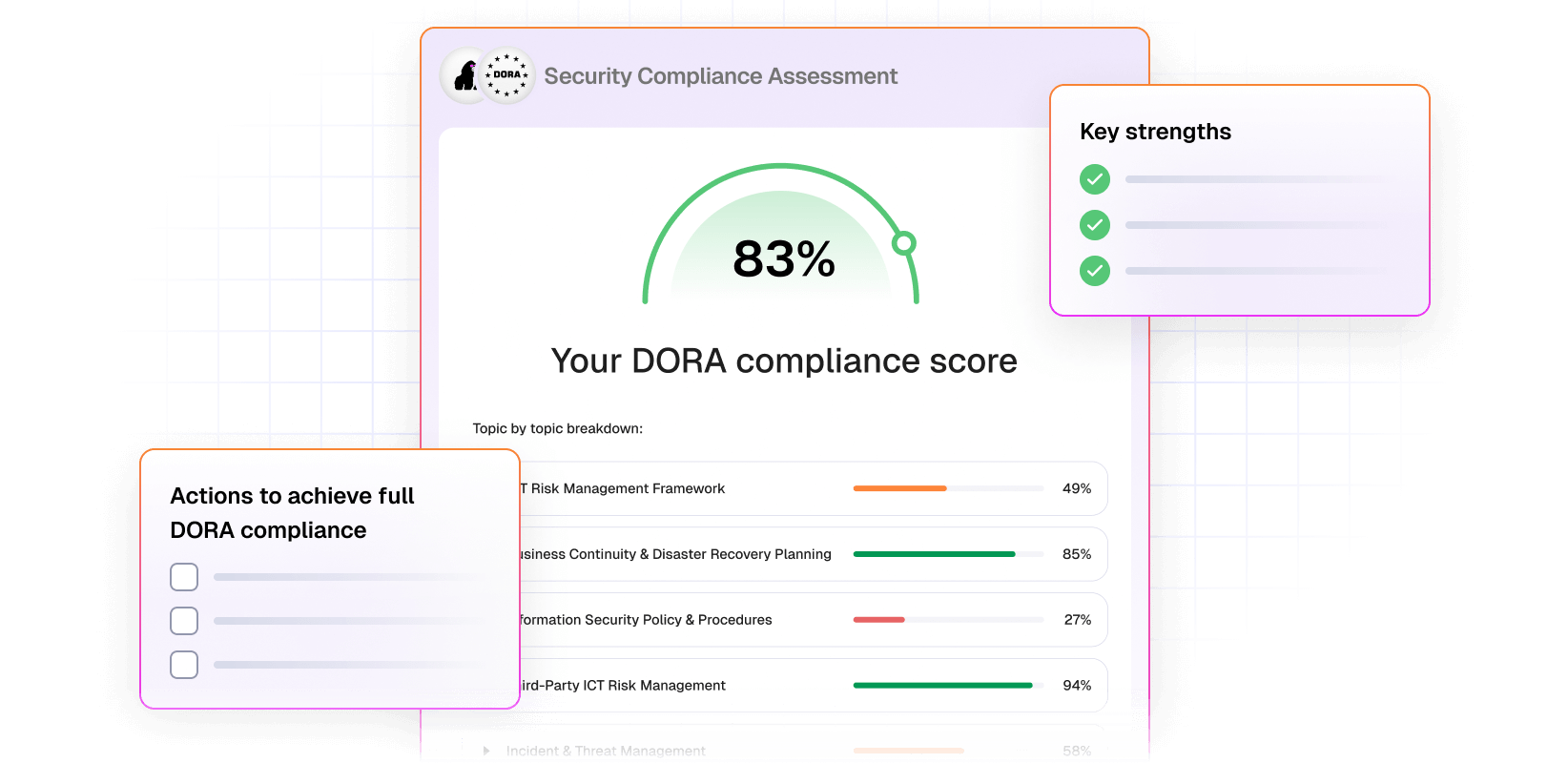Malta’s financial services sector, including banking, insurance, and online gaming, plays a key role in the country’s economy. Over the past decade, Maltese regulators have focused on strengthening compliance and promoting digital innovation to maintain Malta’s global competitiveness. The European Union’s Digital Operational Resilience Act (DORA) builds on these efforts by standardizing ICT risk management, incident reporting, and oversight of third-party providers across Europe’s financial industry. In this post, we’ll explore how Malta is implementing DORA, whether its approach differs from other EU nations, and the ways Maltese regulations already align with DORA’s objectives. We’ll also list several audit firms in Malta that can assist organizations with meeting DORA requirements.

Assess your DORA readiness for free!
Evaluate your organization’s compliance gaps and find areas for improvement—no prior DORA knowledge needed.
Why DORA matters in Malta
DORA primarily targets regulated financial entities—banks, payment institutions, insurers, investment firms—but also extends obligations to third-party IT service providers. In Malta, the Malta Financial Services Authority (MFSA) oversees the financial sector, while the Central Bank of Malta regulates monetary policy and certain banking functions. Both bodies strive to balance innovation with risk mitigation. DORA enforces a cohesive EU-wide standard for cybersecurity and operational continuity that reinforces Malta’s reputation for strong, transparent regulation—a critical factor for attracting international financial and fintech firms.
Because many Maltese organizations operate cross-border, adhering to DORA ensures they can compete effectively in EU markets by demonstrating consistent cyber resilience. It also underscores Malta’s position as a trusted jurisdiction for global financial services, from online payment solutions to more traditional banking.
Is Malta’s approach any different from other EU countries?
As an EU member state, Malta must implement DORA according to the regulation’s core requirements. However, local supervisory nuances can emerge. The MFSA often publishes guidance on how to interpret new EU rules in the Maltese context, sometimes issuing additional clarifications regarding reporting thresholds, timelines, or the classification of critical third-party services.
Malta’s relatively small size and centralized regulatory framework can facilitate a more coordinated roll-out of EU directives compared to larger or more decentralized nations. Nonetheless, financial institutions operating in multiple EU countries should monitor local variations in how authorities interpret specific elements of DORA, ensuring that their compliance strategies stay unified across jurisdictions.
PRO TIP
Set up alerts for MFSA Consultation Papers and Circulars—these often include early interpretations or implementation expectations that can help future-proof your compliance program.
Existing Maltese regulations aligning with DORA
Malta has taken steps to bolster operational risk management, cybersecurity, and data protection well before the advent of DORA. Below is a snapshot of the key regulations and how they overlap with DORA’s requirements:
| Maltese regulation or measure | Focus area | How it aligns with DORA |
| MFSA Rulebooks and Circulars on Operational and Cyber Risk | Detail obligations for banks, investment firms, and insurers around IT governance and vendor oversight | Echo DORA’s emphasis on structured risk assessments, third-party due diligence, and robust ICT governance |
| Central Bank of Malta directives | Encourage financial stability, including guidelines on business continuity and payment system security | Complement DORA’s requirements for incident management and continuity of critical services |
| Data Protection Act (aligned with GDPR) | Enforces breach notification timelines and data privacy controls | Mirrors DORA’s focus on safeguarding sensitive information and rapidly disclosing major incidents that affect data integrity |
These frameworks already require many Maltese financial institutions to maintain a baseline of robust internal controls, vendor oversight, and cyber defenses. With DORA, these expectations become more standardized and cross-border in nature, particularly concerning mandatory incident reporting.
PRO TIP
Perform a DORA-GDPR control mapping—many data protection controls (e.g., breach reporting timelines, access management) overlap with DORA, reducing redundant effort if aligned early.
Impact beyond finance
While DORA’s provisions explicitly address financial entities, the regulation extends to any service provider deemed critical to financial operations. In Malta, that includes software houses, cloud hosting companies, and specialized consultancies that work closely with banks or insurers. A disruption at a non-financial tech supplier might trigger the financial client’s incident reporting obligations under DORA, effectively pulling the vendor into the compliance fold.
For Malta’s burgeoning fintech ecosystem, DORA presents both a challenge—heightened scrutiny—and an opportunity to demonstrate alignment with high-security standards. Firms that effectively adopt DORA-like principles can position themselves more competitively when seeking partnerships with larger financial institutions across the EU.
PRO TIP
Vendors should proactively revise contracts to include DORA-compliant clauses—incident response timelines, testing rights, and audit readiness will be critical for maintaining client trust.
List of DORA auditors in Malta
DORA does not publish a list of designated auditors, but several well-regarded firms in Malta specialize in ICT risk, cybersecurity, and regulatory compliance. Below is a concise overview:
| Firm | Primary expertise | Additional notes |
| Deloitte Malta | Cyber risk, operational resilience, internal audits | Global network with local insight into MFSA and Central Bank of Malta requirements |
| KPMG Malta | ICT risk management, compliance reviews, financial sector audits | Known for advising major Maltese and international financial entities |
| PwC Malta | Cybersecurity, data protection, governance, risk & compliance | Offers tailored solutions for banks, insurers, and fintech startups |
| EY Malta | IT audits, digital transformation, multi-jurisdictional compliance | Experienced in handling complex EU regulatory frameworks for cross-border clients |
| BDO Malta | Internal controls, risk advisory, operational continuity | Often works with mid-sized organizations in financial services and technology |
| RSM Malta | Risk management, IT governance, data protection consulting | Local experience with both Maltese and international clients operating in finance |
When selecting an auditor, Maltese organizations should weigh a firm’s familiarity with the MFSA Rulebooks, local market conditions, and broader EU directives guiding DORA’s enforcement.
PRO TIP
Choose an audit firm that offers sector-specific DORA scenarios (e.g., gaming vs. banking vs. payments)—this contextual understanding can accelerate both implementation and regulator confidence.
Turn DORA compliance into a competitive advantage with CyberUpgrade
For Maltese financial institutions and fintech providers, aligning with DORA isn’t just a regulatory requirement—it’s a strategic opportunity. CyberUpgrade helps organizations across Europe simplify their compliance journey with automated workflows, centralized documentation, and expert-led guidance tailored to MFSA expectations and EU standards.
Whether you’re a bank, insurer, or cloud provider supporting financial services, our platform makes it easy to manage vendor risks, conduct gap assessments, and meet real-time reporting obligations—all within tools your team already uses, like Slack or Teams.
Stay ahead of the curve and protect your business from compliance blind spots. Book a DORA consultation today and let CyberUpgrade turn regulation into resilience.
Securing Malta’s financial future
Malta’s financial services sector is already subject to comprehensive risk management and cybersecurity regulations, making DORA a natural extension of these efforts. By adhering to DORA’s unified EU standards, Maltese institutions can enhance their credibility with investors and partners while minimizing cyber threats. Rather than viewing these requirements as an extra burden, savvy organizations may see them as a framework for streamlining vendor oversight, improving incident response, and securing their digital operations in a rapidly evolving financial landscape.

Assess your DORA readiness for free!
Evaluate your organization’s compliance gaps and find areas for improvement—no prior DORA knowledge needed.









